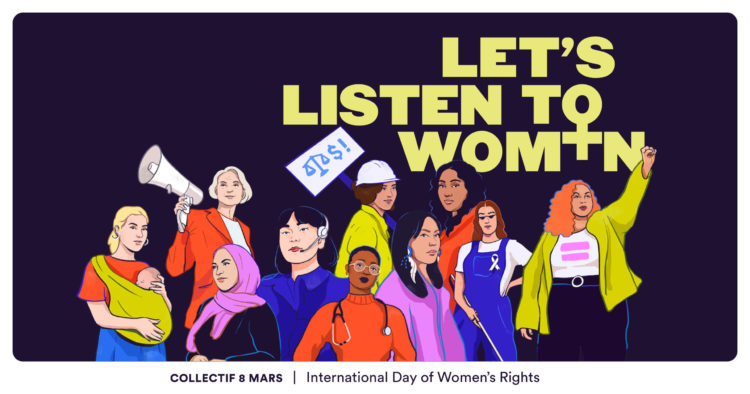
International Day of Women’s Rights : A feminist rendezvous with history
The Fédération interprofessionnelle de la santé du Québec – FIQ is the biggest women’s labour organization in North America. Its members are specialists in health sciences and every day they work for the well-being of the Quebec population, prevention, public and community health and to reduce social inequality. They are members of professional orders and associations, bestowing on them a high level of responsibility toward their patients and the population, in particular to protect their rights and physical and mental integrity.
We entrust the women who work in the public health network with our lives and those of our loved ones.
Chronic devaluation
The current wage structure for healthcare jobs is lagging cruelly behind due to chronic devaluation of the traditionally feminine profession. It is clear that the type of clinical knowledge and techniques that healthcare professionals possess is highly comparable to that of masculine professions. Yet, the wage gap persists and economically penalizes women. Despite the abundance of conclusive evidence, this shows that the undervaluing of healthcare professions is still overshadowed by a very masculine vision of the economy, one that doesn’t recognize the true economic value of the health care and services provided by women.
There is also still a significant imbalance between the wages of healthcare professionals in Quebec and those in other Canadian provinces. Leaving this uncorrected undermines the importance of the healthcare profession in Quebec compared to the rest of the country.
Decades of political decisions that endangered public services, and the hundreds of thousands of jobs held by women in them, have yielded brutal consequences. The loss of buying power, stemming from years of budget cuts for which healthcare professionals have sadly paid the price, also sends a very bad message to the younger generation we are trying to attract to the public health network.
This is a very real issue for the coming years in Quebec, as the population is ageing. A province that promotes the expansion of its healthcare professional workforce will be able to take on the important job of caring for its population, despite the fact that it is rapidly ageing.
In the current global context, not having a vision for retaining the nursing workforce and recruiting a new generation of healthcare professionals will make us particularly vulnerable and not very resilient in times of crisis.
Remedying inconsistencies
What healthcare professionals are asking is for the government to finally correct the iniquities they face.
Despite the adoption of the Pay Equity Act in 1996, fair pay for healthcare professionals remains unresolved. The last employer offers submitted in May are not enough to compensate for the wage catch-up, the need to value the profession and the salary discrimination that targets women in predominantly female sectors. One way to recognize the economic value of work in our society is to set appropriate salaries.
What’s more, the health network finances better salaries through private employment agencies. Network managers who hire independent labour finance private agencies’ profits, while exacerbating the disparities between healthcare professionals in the public network and those from agencies. Agency healthcare professionals can enjoy better working conditions, higher salaries and benefits like having their work permit reimbursed. This needs to be corrected. Despite the FIQ’s many interventions, and the legislative tools and power at its disposal, the government is slow to tackle this inconsistency and continues to finance private agencies instead of paying its own workforce better.
This last year has shown without a doubt that it is absolutely essential that Quebec society be better prepared to face crises. To recognize the strategic value of healthcare professionals’ work and the positive impacts of better pay on labour retention, combined with a reduction in gender inequalities, will help to safeguard our healthcare system and the economy. The government can no longer ignore the contribution of women in the health sector—its credibility depends on it.
One year into the pandemic and a year after the expiry of the provincial collective agreement, it is the Premier’s duty to show up for this important rendezvous with tens of thousands of women healthcare professionals in the health and social services network.
It’s time to listen to women, to healthcare professionals! Nancy Bédard, President of the Fédération interprofessionnelle de la santé du Québec- FIQ